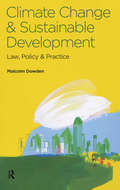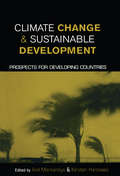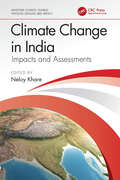- Table View
- List View
Climate Change and Multi-Dimensional Sustainability in African Agriculture: Climate Change and Sustainability in Agriculture
by Rattan Lal Bal Ram Singh David Kraybill David O. Hansen Lars Olav Eik Theodosy MosogoyaThis 35-chapter book is based on several oral and poster presentations including both invited and contributory chapters. The book is thematically based on four pillars of sustainability, with focus on sub-Saharan Africa (SSA): Environment, Economic, Social and Institutional. The environmental sustainability, which determines economic and social/institutional sustainability, refers to the rate of use of natural resources (soil, water, landscape, vegetation) which can be continued indefinitely without degrading their quality, productivity and ecosystem services for different ecoregions of SSA. This book will help achieve the Sustainable Development Goals of the U. N. in SSA. Therefore, the book is of interest to agriculturalists, economists, social scientists, policy makers, extension agents, and development/bilateral organizations. Basic principles explained in the book can be pertinent to all development organizations.
Climate Change and Natural Resources: Environmental Management and Sustainable Development (Environmental Earth Sciences)
by Hüseyin Gökçekuş Youssef KassemThis book provides an overview of promoting the conservation and sustainable use of natural resources and reducing waste and pollution, while also addressing the challenges posed by climate change. Climate change and natural resources are closely linked, as changes in the climate can have significant impacts on the availability and quality of natural resources such as water, air, land, forests, and oceans.Environmental management and sustainable development are crucial to address the challenges posed by climate change and to ensure the long-term viability of natural resources. Also, the planning, implementation, and monitoring of actions that aim to protect and enhance the environment while promoting sustainable development are discussed. In the context of climate change and natural resources, sustainable development involves finding ways to reduce greenhouse gas emissions and adapt to the impacts of climate change, while also promoting resource conservation and sustainable use. As a result, this book is expected to contribute to the existing literature and provide an in-depth study that gives a fresh approach to the academic and multiple stakeholders, including governments, businesses, civil society, and individuals.
Climate Change and Non-infectious Fish Disorders
by Jonathan Wilson Kevin B. Strychar Paul W. Sammarco Jani Ti Tanzil Seng Keat Ooi Serene Hx Tay Yan Xiang Ow Siew Chin Chua Esther Clews Annette Bolton Srivatsan Raghavan Shie-Yui Liong Clara Boglione Akinyi Carol Nyaoke Hélène Volkoff Rune Waagbø Pål A. Olsvik Sofie C Remo Robert J Lennox Jacob W. Brownscombe Chris K. Elvidge Philip Harrison Kathryn Peiman Graham D. Raby Steven J. Cooke Erin Faught Juan Hernandez-Perez Mathilakath M Vijayan Pedro M.G. Guerreiro Sveinung Fivelstad Asbjørn Bergheim Anne Berit Olsen John Colt Willem B MuiswinkelAn important new title on climate change, and its effects on selected non-infectious disorders of fish. Contains contributions by internationally recognized experts who have contributed significantly to our knowledge in this area.
Climate Change and Ocean Renewable Energy (Springer Proceedings in Earth and Environmental Sciences)
by Soufiane Haddout Priya Krishnamoorthy Lakshmi Antonio Mubango HoguaneRenewable-energy is energy that is collected from renewable resources that are naturally replenished on a human timescale. Renewable-energy includes sources such as sunlight, tides, waves, wind, rain, and geothermal heat. According to BP's-2018 Energy Outlook (EO), renewable energy will be the fastest growing source of energy, increasing fivefold by 2040 thus providing around 14% of global primary energy at this future point. On the other hand, climate change is bringing about rising temperatures, which have significant negative impacts on humans and the environment, and transitioning to renewable energy sources, such as biofuels, can help meet this challenge. Transitioning to renewable energy, and reducing reliance on fossil fuels, is one way to help slow down the effects of climate change. While renewables used to be a more expensive option, new clean energy technologies are lowering costs and helping to move economies away from fossil fuels. The 1st International Conference on Climate Change and Ocean Renewable Energy (CCORE 2022), is a virtual conference held from November 4-7, 2022, presenting experiences and ideas through research talks and presentations from diverse fields in climate change and ocean renewable energy. This event offers a platform in bringing together a forum for students, postdocs and established scientists to exchange their ideas and contribute to an integrative approach to climate change and ocean renewable energy.
Climate Change and Plants: Biodiversity, Growth and Interactions (Footprints of Climate Variability on Plant Diversity)
by Shah FahadClimate Change and Plants: Biodiversity, Growth and Interactions Evidence is raised daily of the varying climate and its impression on both plants and animals. Climatic changes influence all agriculture factors, which can potentially adversely affect their productivity. Plant activities are intimately associated with climate and concentration of atmospheric carbon dioxide. Climate Change and Plants: Biodiversity, Growth and Interactions examines how plant growth characters influence and is influenced by climate change both in past and present scenarios. This book covers cutting-edge research of key determinants of plant growth in response to atmospheric CO2 enhancement and global warming. Features Discourses numerous areas of sustainable development goals projected by the UN as part of the 2030 agenda Highlights appropriate approaches for maintaining better plant growth under changing climatic conditions Presents diversity of techniques used across plant science Is designed to cater to the needs of researchers, technologists, policymakers and undergraduate and postgraduate students studying sustainable crop production and protection Addresses plant responses to atmospheric CO2 increases
Climate Change and Resilient Food Systems: Issues, Challenges, and Way Forward
by Vinaya Kumar Hebsale Mallappa Mahantesh ShirurThis book provides insights on innovative strategies to build resilient food systems in the wake of challenges posed by climate change. Providing food security to the growing population especially in developing countries without exacerbating the environment is a major challenge. Climate change is expected to reduce agricultural productivity, leading to a decline in overall food availability and significantly increasing the number of malnourished children in developing countries. Interventions for enhancing the adaptive capacity of farmers especially of small holders needs immediate impetus. The policy formulation and development programs must reorient in the wake of the new expectations and deliverables. This book comprises of sixteen chapters that discuss the trends in global agriculture development and food system. The book highlights different aspects of household food and nutritional security. The chapters covering diverse aspects address food system, rural and urban food chain, factors affecting their sustainability and short and long term solutions to make them climate resilient. Important issues having significant implications on climate change such as Waste management, Value chain, Agri-marketing, etc. are also covered. The book would be an important resource for researchers in food science, environmental sciences and agriculture. It would also be beneficial for students and future scientists working on sustainable agriculture and food security.
Climate Change and Safety in High-Risk Industries (SpringerBriefs in Applied Sciences and Technology)
by Corinne Bieder Gudela Grote Johannes WeyerThis open access book directs attention to the safety implications of disruptive, sustainability-driven changes in sociotechnical systems resulting from climate-change considerations in high-risk industries. It addresses not only the dismantling of currently prevalent systems and structures and the achievement of a stable future state but also the management of processes for establishing new practices in a safe and reliable manner without undue interruption of important functions and services.Leading scholars from various fields of research have contributed to this brief by analyzing case studies as well as through conceptual and methodological work. They propose strategies for coping with new kinds of risk at local and organizational levels. The oil and gas and nuclear industries are two cases investigated here. They present a challenging mixture of continuity and disruption and require strategies for coping with safety and sustainability issues at the same time. Innovativemethods such as real-world experimentation and computer-based simulation are discussed as means of investigating the issues at stake. Climate Change and Safety in High-Risk Industries brings together critical appraisals of the challenges that will be faced by industry, regulatory bodies and decision-makers in coming decades. It analyzes whether safety and sustainability are accurately thought of as competing imperatives or, rather, offer possibilities for a more cooperative approach to the necessary adaptations in our modes of production and consumption.
Climate Change and Socio-political Violence in Sub-Saharan Africa in the Anthropocene: Perspectives from Peace Ecology and Sustainable Development (The Anthropocene: Politik—Economics—Society—Science #37)
by Jean Chrysostome K. Kiyala Norman ChivasaThis book explores the theoretical contribution of peace ecology to the understanding and practice of environmental and conventional peacebuilding. It integrates environmental questions and factors that drive socio-political violence and climate change-induced violence in Sub-Saharan Africa in the Anthropocene.· It demonstrates how international peace and global security are no longer solely grounded in conventional peacebuilding that has evolved from liberal to democratic peace theories, but rather in the complex, critical and synergic relations between peace studies and environmental studies.· It provides a pluridisciplinary body of knowledge that emphasises the need for food security, social climate, social good, social capital and sustainable development at the age of climate change and climate wars.· It underscores the potential of peace ecology to reduce the Earth systems' vulnerability, to mitigate anthropogenic global warming's consequences on humanity, the ecosystem and biodiversity.· It yields various models of peacebuilding, conflict-sensitive and climate-sensitive adaptation strategies to enhance the African Region’s security and stability.Finally, this volume argues that planetary boundaries framework remains the safer space within which human and sustainable development can be pursued and attained, and future generations to thrive. A comprehensive and international response to socio-political violence and climate-change induced violence should take into account the vulnerability of individual countries, regions and the global world in order to achieve the dreams of a better future; that makes this book a cutting-edge scholarly work.
Climate Change and Soil Microorganisms for Environmental Sustainability (Microorganisms for Sustainability #28)
by Meenu Saraf Dinesh Kumar Maheshwari Dweipayan GoswamiThis book provides information on the plant-microbe interactions which hold vital implications for addressing the global challenges of climate change, food security and environmental conservation. It also delves into the interconnectedness within the microbial world and its association with plants. The phenomenon of quorum sensing, a bacterial communication method that facilitates collective decision-making, has been discussed as well. The authors illustrate how these mechanisms enable soil microbes to engage in symbiotic relationships with plants, thereby promoting broader environmental sustainability goals. Facing the pressing global issue of climate change, the book elucidates the impact of these symbiotic relationships on climate regulation, tracing how these interactions influence the carbon cycle and greenhouse gases balance. This contributed volume thus weaves a compelling narrative that combines scientific knowledge with the global sustainable development goals. The book is useful for scholars and researchers working in microbiology, botany, ecology, and environmental sciences.
Climate Change and Soil-Water-Plant Nexus: Agriculture and Environment
by Ram Swaroop Meena Md. Mizanur Rahman Jatish Chandra BiswasThe edited book provides a comprehensive and up-to-date overview of scientific developments in agricultural sustainability under changing climate conditions. It focuses on the linkages among soil, water, and crops and their management options to maintain soil health and ensure a sustainable crop production environment. The book addresses the scenarios and challenges of agricultural sustainability in the face of climatic change. With increasing pressure on our limited land and water resources to produce higher crop yields for a growing global population, the efficient use of soil, water, and fertilizers is crucial for achieving most of the United Nations' Sustainable Development Goals (SDGs). The book presents climate change mitigation and adaptation options to help achieve these SDGs. It highlights the impact of climate variability on agricultural production and the functions of ecosystems, emphasizing the importance of developing climate-resilient agriculture to sustain food production and reduce greenhouse gas emissions. The book explores the soil-water-plant nexus and its response to changing climate, characterizing seasonal and inter-annual climatic variability in crop growth and yield. Different chapters evaluate the effects of climate change on soil health degradation, depletion of soil nutrients and carbon contents, and crop responses to climate variability. This book is of interest to academicians, researchers, scientists, capacity builders, and policymakers. Extension personnel will benefit from its insights, and it serves as valuable supporting material for graduate students of agriculture, forestry, ecology, soil science, and environmental sciences in understanding and designing their own research.
Climate Change and Sustainable Agro-ecology in Global Drylands (CABI Climate Change Series #22)
by Rattan Lal Adel S. El-Beltagy Kauser MalikDrylands, a home for nearly 2.5 billion people, are highly vulnerable to anthropogenic climate change, and dryland area may expand to 50% of the Earth's surface by 2100. Climate change may aggravate the prevalence of undernutrition and malnutrition because of adverse effects on quantity and quality of food production in these regions. This book takes a holistic approach to sustainable management of drylands to make agriculture drought-resilient. Eminent scientists from around the world share their knowledge and experiences for adaptation and mitigation of the anthropogenic climate change through innovation in sustainable management of water, soil, crops, livestock, and fisheries. They anticipate that climate change will have major impacts on agro- ecosystems which requires continuous dynamic assessments, globally, regionally, and at the local level where the major action of adaptation would have to occur. The assessment will require international cooperation and national capacity-building. This book emphasizes approaches such as smart and precision agriculture, conservation agriculture, and new innovation and technology as tools for adaptation and mitigation. Several chapters are devoted to the human dimensions and policy considerations with emphasis on enhancing coping and adaptive capacity. This book addresses the picture after COP27, including loss and damage, governance and finance. This book: Examines sustainable management for drylands as a solution to environmental and food security issues. Uses a holistic approach to evaluate sustainable management of drylands. Explains how researchers are translating science into action for greening global drylands. This work will be valuable to students and researchers in agroecology, climate change science and dryland agriculture.
Climate Change and Sustainable Development
by M. H. Fulekar Rama Shanker DubeyClimate Change and Sustainable Development covers the climatic and atmospheric changes, greenhouse gases and their impact on eco-system, biodiversity, water resources, agriculture and food security, human health, extreme weather and environment across two sections. The mitigation and adaptation strategies involving sustainable development is also illustrated including efficient technology, renewable energy, developmental activities control and so forth. Nanotechnology for sustainable development, forest protection, environment, social and economic sustainability and climate change policy planning of international bodies like UNFCC, UNDP, Kyoto protocol is also included. Features: Covers climate change fundamentals and its impact on different ecosystems and natural disasters Describes non-renewable energy aspects like fossil fuel, coal, oil, natural gas and so forth Explores sustainable development in terms of environment, social and economic aspects Includes species diversity and loss, agriculture productivity, water resources scarcity, health and environmental, rise in sea level and coastal area submergence Illustrates scientific hybridization of traditional ecological knowledge for enhancing climate change adaptation This book is aimed at graduate students and researchers in engineering and public policy, engineering management, sustainable engineering, renewable energy engineering, environmental engineering, and sustainability.
Climate Change and Sustainable Development: Law, Policy and Practice
by Malcolm DowdenWith the profile of environmental issues at an all-time high, this book provides a much needed examination of the related effects of these issues on the property industry. Within the property industry at the moment it is difficult to assume an overview of these issues, and to properly assess the implications of climate change for commercial property. This is the first book that pulls together the different elements of climate change into one coherent argument, explaining what needs to be done to ensure the future of the property market. The main issues discussed are: mitigation, adaptation, energy efficiency and property valuation, in addition to providing informed commentary on the laws and practical guidance to practitioners.
Climate Change and Sustainable Development: Prospects for Developing Countries
by Anil Markandya Kirsten Halsnaes'Makes a substantial contribution to the practical, effective analysis of climate change mitigation options in developing countries.'Development And Cooperation'The book is an excellent exercise and a good source of detailed information, and a basis for further discussions. Any person interested in this major environmental problem should read it.'International Journal of Environment and Pollution'Markandya and Halsnaes' collection is thoughtfully put together and can be recommended to all the practitioners in the fields of climate change and sustainable development.'The Journal of Energy LiteratureThis text argues that the policies pursued by developing countries will be crucial in determining the progress of climate change. Many are industrializing rapidly and the largest, particularly China and India, could have an impact at least as significant as that of the already industrialized economies - the reason given by President Bush for taking the US out of the Kyoto Protocol. The future of sustainable development in large measure depends on developing countries. This book develops a pragmatic framework for evaluating the climate change options faced by each developing country, depending on their individual circumstances. It assesses present methods, suggests how these might be improved, and proposes ways in which social and developmental aspects can be taken into account. Its discussion of the issues and the methods presented contribute to the practical analysis of climate change mitigation options in developing countries. The book should be useful to professionals, governments, international organizations and environmental groups working on climate change issues; as well as researchers, academics and students in economics, environmental and development studies and international affairs.
Climate Change and Terrestrial Carbon Sequestration in Central Asia
by B. A. Stewart R. Lal M. Suleimenov D. O. Hansen P. DoraiswamyThis book brings together current knowledge of terrestrial C sequestration in Central Asia. The themes treated include: biophysical environments, water resources, sustainable agriculture, soil degradation, the effects of irrigation schemes on secondary salinization, soil management and its relationship to carbon dynamics; the relationship between f
Climate Change and Water Resources
by Sangam Shrestha Vishnu Prasad Pandey Mukand S. BabelCovering the various aspects of water and climate change, Climate Change and Water Resources presents the principles of climate change science and its effects on earth's water supply. Utilizing the knowledge and expertise from well-known experts in the field, the text provides a broad outline of the many interrelated aspects of climate variations,
Climate Change and Water Resources in Africa: Perspectives and Solutions Towards an Imminent Water Crisis
by Salif Diop Peter Scheren Awa NiangThe focus of this book is on the key water-related vulnerabilities to climate change in Africa, particularly in its most vulnerable areas, exploring potential management responses to such vulnerabilities. The African countries are particularly exposed and vulnerable to the negative impacts of climate change, with important impacts on water resources and hydrological systems, water availability, water resource management and sea level variations. Already, under various anthropogenic pressures, the status of water resources in Africa has been changing over the past decades, with decreasing water quality, falling groundwater levels, and variability in rainfall, both in terms of timing and intensity. Climate change will further accelerate the rate of change, affecting the ability of people and societies to respond in a timely manner. It is clear that there is no quick fix to the pressures imposed on water resources by climate change. Increasing the resilience of ecosystems and communities to extreme events such as flooding and drought, and integrating climate change risks and opportunities into development decision-making is indeed a key challenge, as much a technical climate-change one, as a political and developmental challenge. The book, in this regard, intends to contribute to the debate around climate change in relation to water resources management in Africa, and in particular inform policy decisions and actions that will improve governments’ and communities’ ability to manage the challenges of climate change and variability in relation to the aquatic ecosystems that they depend on. The knowledge collected in this book will benefit policy makers, researchers, as well as other stakeholders.
Climate Change and Water Resources in Mediterranean Countries: Climate Change and Water Crisis (Environmental Earth Sciences)
by Hüseyin Gökçekuş Youssef KassemThe book provides the opportunity to connect with experts on water treatment techniques, eco-hydrology, hydro-informatics, emerging pollutants in water resources and water management from all over the world. Water is still one of the most significant problems in the world and especially in the Mediterranean region. In this thematic book, all possible approaches and suggestions aimed at finding solutions to overcome water scarcity, better alternatives to treat wastewater and ensuring access to clean water for all communities are valuable subjects that are included for directing authorities to take a step further towards overcoming water-related problems for everyone around the world.
Climate Change and Water Resources in South Asia
by M. Monirul Qader Mirza Q. K. AhmadThis book addresses the most pressing water resource issues in South Asia, particularly in relation to climate change and variability. This is a region characterised by abundant water during the monsoon, when devastating floods occur, and by scarcity of water and droughts during the dry period. These extreme events often cause substantial damage to
Climate Change and Water Scarcity in the Middle East: A Transitional Approach (Earthscan Studies in Water Resource Management)
by Mariëlle Snel Nikolas Sorensen Reed PowerAs water's significance as a geopolitical resource is poised to surpass that of oil, this book explores the adaptation of Water, Sanitation, and Hygiene (WASH) services in the Middle East to climate change challenges, leveraging the Humanitarian-Development-Peace nexus for a sustainable transition and resilient solutions. Delving into the humanitarian and development sectors across the region, the authors advocate for a transformative approach towards more innovative, integrated, and localized programming. It draws a parallel between the increasing global shift in humanitarian needs, as starkly revealed by the COVID-19 pandemic, and the ongoing devastation wrought by climate change, particularly through water-related crises such as flooding, drought, famine, and conflict. The authors stress the urgent need for adaptive and sustainable strategies that can swiftly respond to evolving climate challenges. This book argues that there is currently a window of opportunity for WASH practitioners to develop broader, multi-sectoral experiences to meet these challenges. Drawing on discussions with humanitarian and development practitioners and new contemporary case studies, this book analyzes the financial, institutional, environmental, technical, and socio-cultural considerations for creating sustainable WASH services in transition. The narrative emphasizes the urgent need for a Humanitarian-Development-Peace nexus approach, advocating for multisectoral collaboration and localization as vital to addressing protracted crises and climate change's escalating threats. It calls for a strategic shift towards organizations that merge immediate humanitarian aid with sustainable development, enhancing local capacities for effective, enduring solutions. The authors conclude by outlining practical actions for humanitarian and development organizations at the local, national, regional, and global levels to support effective integrated and transitional WASH programming in the future.
Climate Change and the Coast: Building Resilient Communities
by Bruce C. Glavovic Ailbhe Travers Mick Kelly Robert KayCoastal communities are at the frontline of a changing climate. Escalating problems created by sea-level rise, a greater number of severe coastal storms, and other repercussions of climate change will exacerbate already pervasive impacts resulting from rapid coastal population growth and intensification of development. To prosper in the coming deca
Climate Change and the Microbiome: Sustenance of the Ecosphere (Soil Biology #63)
by Ajit Varma D. K. Choudhary Arti MishraThis book highlights the impact of climate change on the soil microbiome and its subsequent effects on plant health, soil-plant dynamics, and the ecosphere. It also discusses emerging ideas to counteract these effects, e.g., through agricultural applications of functional microbes, to ensure a sustainable ecosystem.Climate change is altering the soil microbiome distributions and thus the interactions in microbiome and plant‐soil microorganism. Improvement of our understanding of microbe-microbe and plant-microbe interaction under changing climatic conditions is essential, because the overall impact of these interactions under varying adverse environmental conditions is lacking. This book has been designed to understand the impact of climate change, i.e., mainly salt and drought stress, on the soil microbiome and its impact on plant, yield, and the ecosphere.The book is organized into four parts: The first part reviews the impact of climate change on the diversity and richness of the soil microbiome. The second part addresses effects of climate change on plant health. The third part discusses effects on soil-plant dynamics and functionality, e.g., soil productivity. The final part deals with the effects of climate change on ecosystem functioning and also discusses potential solutions.The book will appeal to students and researchers working in the area of soil science, agriculture, molecular biology, plant physiology, and biotechnology.
Climate Change in India: Impacts and Assessments (Maritime Climate Change)
by Neloy KhareThe climate over the Indian subcontinent is influenced by complex interactions between the atmosphere, ocean, and land, along with human interventions that are influencing heat extremes, changing monsoon patterns, sea-level rise, and posing serious threats to lives and livelihoods among populations in India. This book, based on recent studies and research, explains how and why the climate is changing across India and how these changes are expected to evolve in the future. It takes a holistic view of the climate from India’s perspective and discusses important themes such as groundwater, land use, livestock, and natural disasters. Readers will have an in-depth understanding of impacts and possible adaptations.Features Includes case studies of groundwater and the effect of climate change. Identifies land use and land cover changes in different regions in India. Discusses the implications of past and present climate change on various livestock types. Explains various natural hazards and their relationship to climate change. Describes technological intervention in climate change. Researchers, academics, and graduate students in Earth sciences, climatology, meteorology, or environmental studies working on projects related to climate change will find this an invaluable reference. Governmental organizations, institutions, and global NGOs will also benefit from the insights presented in this book.
Climate Change in Sustainable Water Resources Management (Springer Water)
by Omid Bozorg-HaddadThis book provides a comprehensive approach to all aspects of water-related subjects affected by climate change that expand readers' attitudes toward future of the management strategies and improve management plans. It summarizes climate change scenarios, models, downscaling methods, and how to select the appropriate method. It also introduces practical steps in assessing climate change impacts on water issues through introducing hydrological models and climate change data applications in hydrologic analysis. The book caters to specialist readers who are interested in analyzing climate change effects on water resources, and related issues can gain a profound understanding of the practical concepts and step-by-step analysis, which is enriched with real case studies all around the world. Moreover, readers will be familiar with potential mitigation and adaptation measures in sustainable water engineering, considering the results of hydrologic modeling.
Climate Change in the Arctic: An Indian Perspective
by Neloy KhareThe Arctic, in the polar region, the northernmost part of Earth, is the hotspot for climate change assessments and the sensitive barometer of global climate variability. This book includes the scientific observations in the Arctic region’s climate and the results obtained by scientists at the Indian Arctic station Himadri over the past decade. Designed and structured to incorporate multi-dimensional climate change research output, it is a significant contribution toward understanding, among other issues, the role of persistent organic pollutants and mercury, as well as the increase of carbon monoxide during ozone reduction in the Arctic. Features include: Highlights the achievements of climate change research in the Arctic region Includes case studies of scientists in the Arctic and their significant achievements through the Indian research base Himadri Provides a thorough review of palaeoclimate change studies, the impact of climate change on biotic components and the impact of climate change on abiotic components Provides specific details on the study of ozone depletion phenomenon over the Arctic region Covers a wide range of research contributions Details sea ice variability in the context of global warming over the Arctic region Connects seismogenesis with the climate change in the Arctic region This book will be an important read for researchers, students and all interested professionals.
























